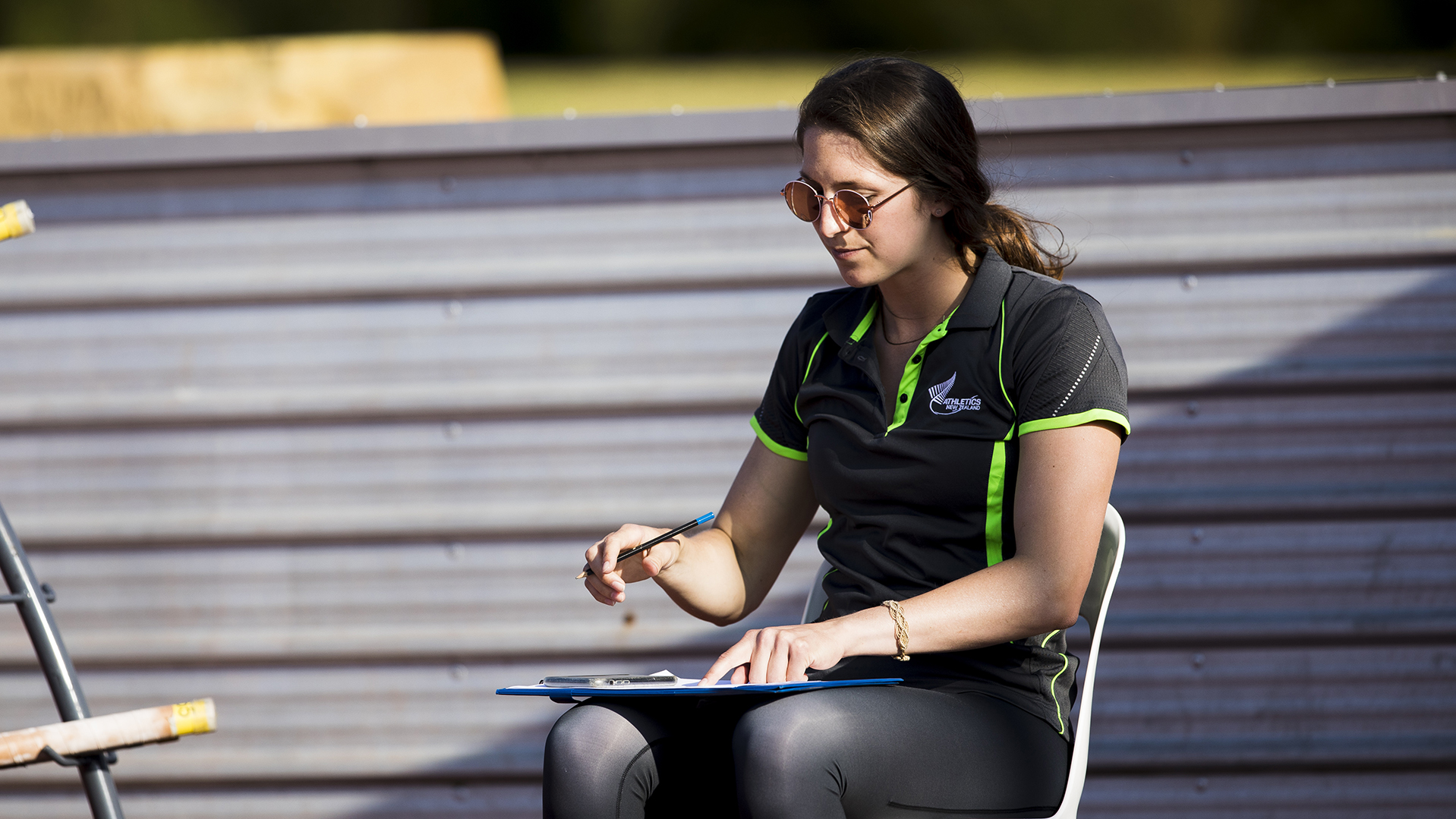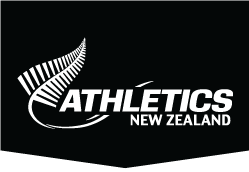News & Updates
Top athletes give back to the sport through officiating

Eliza McCartney Officiating. (Photo: Alisha Lovrich)
Three prominent New Zealand international athletes are partially qualified officials happy to give back to the sport. Steve Landells speaks to pole vaulting superstar Eliza McCartney, Olympic high jumper Hamish Kerr and Paralympic javelin champion Holly Robinson about their journey into officiating and why they would encourage others to make the same step.
Holly Robinson
While it is no great surprise to see Holly Robinson at track meets on a home track in Dunedin during the summer season.
What is perhaps less well known is that the Paralympic F46 javelin champion is just as likely to be working as an official at the Caledonian Ground as she is to be in competition mode.
In recent seasons the down-to-earth West Coaster has relished her role ensuring the rules are administered fairly to all competitors.
So what was it that prompted the New Zealand international to get involved in officiating?
“There was a big push a couple of years ago to get more athletes graded in Dunedin because we had some big events coming up like the NZ Masters Champs and Colgate Games,” recalls Holly.
“So, I put my hand up and got my C Grade throws assessment, which was really cool,” explains Holly. “I know that we need more officials in the sport, so it was nice to help out and as an athlete it also nice to see something from the other side of the fence.
“It was great to experience what the officials go through and the first time I did officiating I was buggered! I thought ‘holy heck’ what if you are doing this for four or five days in a row? It made me appreciate what the officials do for us as athletes.”
Holly describes qualifying for her C Grade throws certificate as a “straightforward” process and although her knowledge and understanding of the rules was generally good – she says it was nice to gain some new knowledge.
“I am not a hammer thrower, so it was nice to learn about rules I was unaware of,” she adds. “If I hadn’t sat my certificate I would never have learned about other events.”
Supported by a group of experienced officials in Otago including Joan Merrilees, has massively helped ease Holly into the role.
However, operating on the other side of the fence to that of an athlete has occasionally presented its challenges.
“For me the hardest decision is marking whether the javelin landings are legitimate or not,” admits Holly. “I can now understand what the officials are going through. But I have to be fair to everyone. When working as an official, I’m there to do a job.”
Holly has lost count of the number of times she has worked as an official over the past couple of seasons and fully expects this summer to re-engage as an official to help out at local meets.
It has been a rich and fulfilling experience and one she would also encourage other athletes to pursue.
“Working as an official has given me a full understanding of how hard the officials work and how much they give back to us, so in a way it when I work as an official it is me giving back as well,” she explains. “As an official I just love being around the other athletes and being a part of the athletics community.”
Hamish Kerr
Hamish Kerr has called upon other younger athletes to take up officiating as a means of giving back to the sport and helping its long-term growth.
The Olympic high jumper sat his C grade jumps assessment while in MIQ on his return from Tokyo and he can’t wait to get involved as an official this summer.
“Seeing the likes of Eliza (McCartney) and Holly (Robinson) officiate has set a really good precedent,” says Hamish. “A really cool part of our sport that the top athletes are so approachable and visible. They have both shown how to give back to a sport which has given them so much.
“I feel the same way. I love athletics, it has given me so much and without athletics I wouldn’t have the same quality of life. I’m in a very privileged position that athletics is essentially my job but part of that comes with the responsibility of giving back to the sport. It is in our interest to help continue to grow the sport, so for me it was an easy decision to help out.”
Given his background as New Zealand high jump record-holder it was logical that Hamish sat his C Grade jumps assessment.
And while many of the rules were familiar to the Christchurch-based athlete several were discovered for the first time.
“I found you can high jump with two shoes, one shoe or no shoes,” he says with a smile while not revealing whether he was planning a different shoe/no shoe strategy for the forthcoming season.
Hamish fully expects to be down at the track officiating at Nga Puna Wai this summer and would like to see more people engage in the role to help aid the growth of the sport.
“If you love something you want to see it continue to evolve and I think that as young people we have some good ideas and can bring fresh blood to the table. I think that if we can help out and bring a new spin or approach to different elements and something good comes out of that, then that is really positive.”
Eliza McCartney
For 2016 Olympic pole vault bronze medallist Eliza McCartney getting involved as an official is simply a way of giving back to the sport she loves.
Partly inspired by her parents, who are both graded officials, Eliza and others in her training group also pursued their basic qualifications determined to make a small difference.
“I noticed when competing in Auckland that over the years I would see the same group of officials at events,” she explains. “I was impressed by their dedication and how much time they gave to the sport.
“There is also no secret we have a shortage of officials and there is always a need for more. As pole vaulters we often attend meets but might not compete at all of them, so a number of us decided to sit our C level assessment for jumps to help support the officials.”
Over the past couple of seasons, Eliza has helped out in a range of roles from bar judge to timing between jumps while she and several other athletes have also help raise and lower the bar – a role which it is not necessary to be a graded official – but which helps speed up the competition.
While principally working as a pole vault official on a couple of occasions she has also helped out on high jump, but is there anything she has learned from officiating she has been able to apply as an athlete?
“It is interesting because you hear some athletes say coaching helps their own athletics career and to some degree that is true of officiating,” she adds. “As an athlete you are aware of many of the rules but sometimes a few minor rules pop up that perhaps I was unaware of – and I think this makes you understand your rights as an athlete a little bit more.
“Yet the biggest thing I get out of officiating is that appreciation of their role. Officials are not paid but it is such a time commitment. The simple fact is the sport cannot function without them.”
Eliza admits one of the more challenging aspects of the role is retaining her neutrality when many of her friends from the pole vaulting community are competing.
Yet not for one moment has she regretted her involvement as an official and she would encourage others to make the same step.
“It is small way of making a difference and giving back to the sport,” she adds.
***To find out more about becoming an official go here or contact Athletics NZ Officials Development Trevor Spittle. M: 021 338 700. E: trevor@athletics.org.nz
